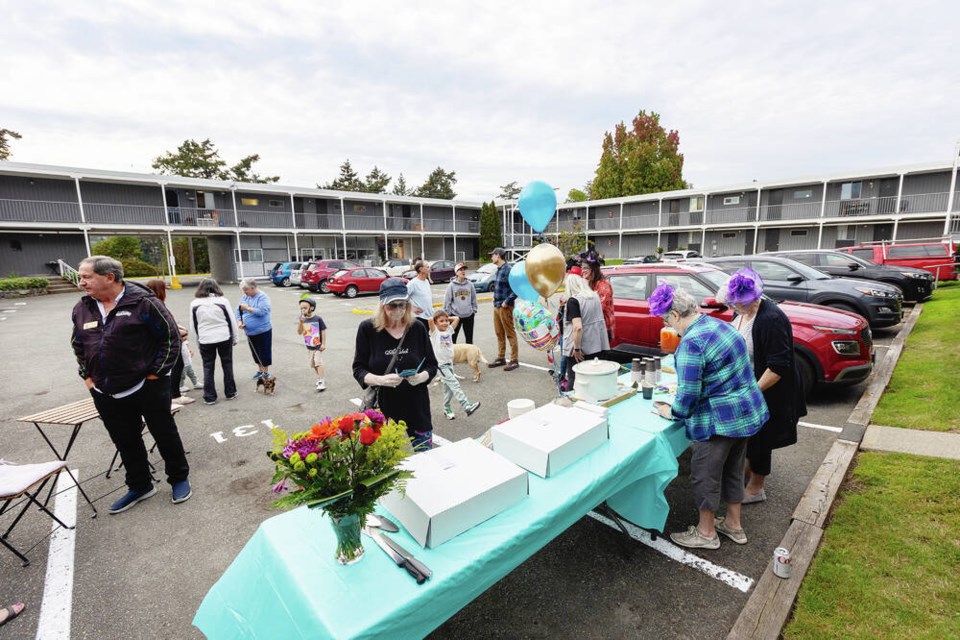Sandra McMullen’s nine-year-old daughter is enrolled in karate classes this fall, and the single mother of two said there may also be some extra money for groceries and other extracurricular activities.
The home-care worker, along with about 50 other residents of Christie Apartments in View Royal, is breathing a little easier after an arbitrator at the province’s Residential Tenancy Branch dismissed their landlord’s application for a $130-a-month increase in rent.
Killam Apartment Real Estate Investment Trust, which acquired the 161-unit string of rental apartments and townhouses along a narrow peninsula on Portage Inlet in early 2020, had applied to the Residential Tenancy Branch for the rent increases to pay for roof repairs on two buildings and repaving a driveway.
The residents, many of them “low-income earners” and long-time renters, said the Halifax-based company was taking advantage of the province’s Additional Rent Increase for Capital Expenditures, known as ARI-C, which came into effect in 2021 and allows landlords to transfer the costs of repairs to tenants through rent increases.
Killam REIT is one of Canada’s largest real estate trusts with a $5.2-billion portfolio of properties. It reported a $127-million profit in its first quarter in March and $114-million profit in its latest quarter in June
Julie Beauchamp, a staff lawyer at Together Against Poverty Society who represented the tenants at the hearing, said it’s time that landlords like Killam REIT be required to open their books and prove they can’t afford to make repairs through existing rental income before they’re allowed to raise rents.
“To see Killam brag about how much money they are making to their investors at the same time they are saying to their tenants they need rent increases to cover building repairs is insulting,” Beauchamp said in a statement.
“It is time the provincial government recognize they have made a mistake in allowing these rent increases without requiring even basic confirmation that the landlord cannot already afford to make them through existing rent.”
In the Residential Tenancy Branch decision, the presiding arbitrator denied Killam’s application for the additional rent increase, finding that it was reasonably foreseeable that the buildings would require repairs to the roofs, and that the tenants should not be held responsible for the landlord’s decision to purchase a 60-year old building.
The issue to be decided was whether the landlord was entitled to impose an additional rent increase for capital expenditures of $251,210 for a flat roof replacement.
The arbitrator said in its decision: “I find that [the landlord] could have chosen to not purchase a residential property that needed a new flat roof. But they did. And then three years later they finally replaced the flat roof in question. I find that the tenants in this dispute are not responsible for the landlords’ choices.
“I dismiss the Landlords’ application … without leave to reapply.”
Together Against Poverty Society said the decision does not prevent the landlord from seeking future rent increases for repairs, and residents remain worried the attempt could be the beginning of efforts by the landlord to get rid of its low-income tenants in order to re-rent units at much higher rates.
Myrna Frizell, who has lived at Christie Point with her husband for 13 years, said she’s wondering what comes next.
“Are we supposed to pay for every repair the landlord has to make? What are we even paying rent for if it isn’t used to repair the building?”
Residents of Christie Point gathered in the parking lot of the Hemlock Building Tuesday evening, sharing a cake to celebrate their victory.
But it’s with a sense of caution for residents like McMullen, who said many tenants across the province are dealing with the same issues.
The Christie Point apartment dwellers are asking the provincial government to amend the ARI-C legislation it passed in 2021.
“We don’t want other tenants in 小蓝视频 to have to go through this stressful process and, for those who are currently going through it, we want to let them know there is hope,” said McMullen, who pays $2,020 a month for a small two-bedroom apartment for herself and children ages 7 and 9.
She said Christie Point is home to seniors, students and others living on fixed incomes amid rising costs of living. “For me, it’s a question of what are we going to do without.”
In June, the Housing Ministry said it had received 368 applications under the ARI-C legislation. Of those, 186 applications had been granted — including 175 for capital expenditures — and 45 were dismissed.
Another 34 applications are classified as open, while 45 have been withdrawn and two have been settled.
>>> To comment on this article, write a letter to the editor: [email protected]




